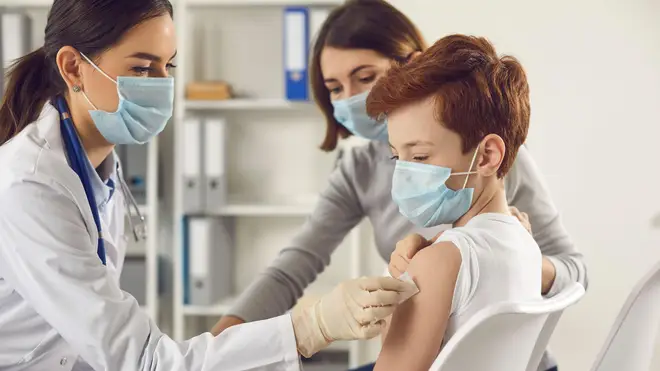
Paul Brand 10am - 12pm
19 July 2021, 16:45 | Updated: 19 July 2021, 21:47

Nadhim Zahawi update on JCVI advice on vaccinating children
Covid-19 jabs will be rolled out to clinically vulnerable children over the age of 12 and those nearing their 18th birthday, the government has confirmed.
Children who are at increased risk of coronavirus are to be offered the Pfizer-BioNTech vaccine on the NHS "as soon as possible", as are those living with people with weakened immune systems, the Health Secretary has announced.
Sajid Javid said he had accepted the advice of the independent Joint Committee on Vaccination and Immunisation (JCVI), which has ruled out mass vaccination of healthy children for now.
Read more: 'Freedom Day' blow to nightclubs as Covid passports needed from autumn
Read more: 'If not now, when?': PM defends 'Freedom Day' as restrictions lift in England
Experts also recommended making jabs available to those who are nearing their 18th birthday, which was also accepted by Mr Javid.
The move means thousands of children in the UK aged 12 to 15 with the following conditions can access the vaccine: severe neuro-disabilities, Down's Syndrome, immunosuppression, multiple or severe learning disabilities.

Other conditions, including type 1 diabetes, are not currently included in the list.
Under existing guidance, young people aged 16 to 17 with underlying health conditions which put them at higher risk of serious Covid should have already been offered a jab.
Read more: No10 urged to explain amber rule change for those not 'UK vaccinated'
Read more: Minister challenged on quarantine for those jabbed abroad
The JCVI has also said those aged 12 to 17 who live with an immunosuppressed person, such as a parent or grandparent, should be offered a Covid vaccine.
This is to protect loved ones at home who are at higher risk of serious coronavirus and who may not get the full immune protection from their own Covid vaccines.
However, the health secretary has now confirmed he has accepted the JCVI's suggestion and is now asking the NHS to prepare jabs for those who are eligible.

PM explains why it's 'essential' for people to test, trace and isolate
He said: “Today’s advice from the independent Joint Committee on Vaccination and Immunisation (JCVI) means more vulnerable young people at greatest risk from this virus can now benefit from COVID-19 vaccines.
"I have accepted their expert recommendations and I have asked the NHS to prepare to vaccinate those eligible as soon as possible.
“Young people aged 12 to 15 with severe neuro-disabilities, Down’s Syndrome, immunosuppression and multiple or severe learning disabilities, as well as people who are household contacts of individuals who are immunosuppressed, will be eligible for vaccination soon.
Read more: Majority of Covid patients not double-jabbed - Chief Scientific Adviser
Read more: Starmer slams PM and Chancellor over isolation U-turn
“Our independent medicines regulator, the Medicines and Healthcare products Regulatory Agency, has approved the Pfizer/BioNTech vaccine for people aged 12 and over as it meets their robust standards of safety, effectiveness and quality.
“Today’s advice does not recommend vaccinating under-18s without underlying health conditions at this point in time. But the JCVI will continue to review new data, and consider whether to recommend vaccinating under-18s without underlying health conditions at a future date."

James O'Brien on 'Freedom Day'
The medicines regulator, the Medicines and Healthcare products Regulatory Agency (MHRA), has already approved the Pfizer-BioNTech Covid-19 vaccine for use among children aged 12 and over in the UK.
The JCVI said it was not currently advising that children outside these groups receive a vaccine because the benefits do not outweigh the potential risks.
Fewer than 30 children have died of Covid-19 in the UK as of March, and Covid rarely causes severe disease in children without underlying health conditions.